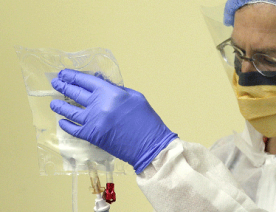
Only a small number of Americans have had their DNA tested to discover their genealogy or detect any disease risks, but a majority say they would be interested in one day taking a genetic test. However, Americans are not entirely convinced about the reliability of genetic testing, and there is some apprehension about the confidentiality of their genetic information.
The latest national poll conducted by The Associated Press-NORC Center for Public Affairs Research also finds that the public supports the use of genetic information in criminal investigations. Fifty-one percent say genetic information should be shared with the police only with consent of the person tested, while 33 percent say consent is not necessary and 13 percent oppose law enforcement’s use of genetic testing information altogether.
Seventeen percent of adults have undergone genetic testing. Of that group, 65 percent wanted to learn more about their ethnic heritage. Only 39 percent say their motive was to learn about their own or future children’s disease risk. Similar motivations are cited by the 52 percent who express interest in doing a test at some point.
The nationwide poll was conducted by The Associated Press-NORC Center for Public Affairs Research June 13-18, 2018, using AmeriSpeak®, the probability-based panel of NORC at the University of Chicago. Online and telephone interviews using landlines and cell phones were conducted with 1,109 adults. The margin of sampling error is +/- 4.1 percentage points.


